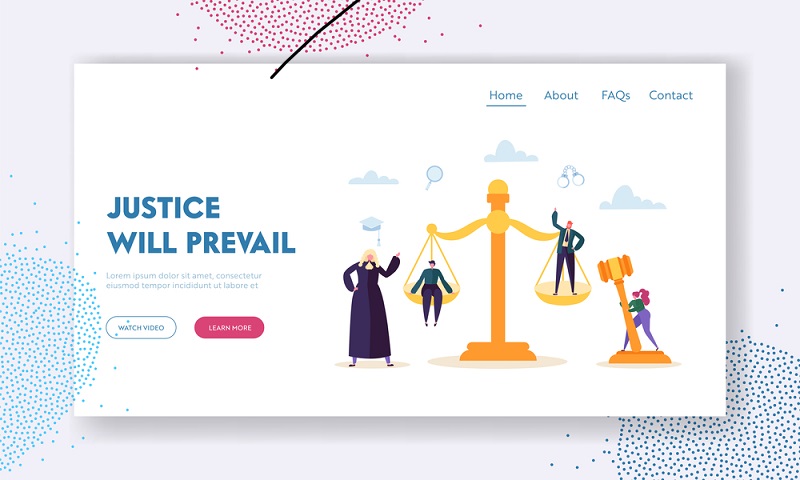Search engine optimization (SEO) has become an increasingly important part of digital marketing for businesses of all kinds, including law firms, although a surprising 14% of law firms still don’t have a website. A 2020 study found that 79% of brands claimed SEO was their most effective channel. Back then, 84% of law firms planned to increase their digital marketing budgets, and we’d hazard a guess even more have done so since then. With more and more people using search engines like Google to find services, having an effective SEO strategy is critical for lawyers who want to attract new clients online – online searches account for 68% of digital traffic for law firms. If you’re still on the fence about spending money on SEO, here are some of the key reasons why SEO should be a priority for legal marketers and lawyers. Improved Website Visibility The main goal of SEO is to improve a website’s rankings in search engines for relevant keywords and phrases. Higher search rankings lead to more organic traffic, meaning more people will find your law firm’s website when searching for legal services you provide. Without SEO, potential clients may never come across your website, even if it offers exactly the kinds of services they need. SEO makes a website more discoverable and visible to searchers. More Client Leads & Business Opportunities More website visibility directly translates to more opportunities to gain clients. The majority of adults use search engines not only for basic information lookups but also when they need to research products and services before making a purchase. Someone searching for “personal injury lawyer Dallas” or “family law attorney Los Angeles”, for example, is actively looking for legal representation. Appearing on the first page of search results for common lawyer searches will expose your firm to more of these prospective clients. A strong SEO strategy that improves website rankings will bring in more leads and inquiries. Cost-Effective Marketing Unlike paying for ads, organic SEO is essentially free. You don’t have to pay every time someone clicks on or views your site listing. The investment is primarily in the time spent optimizing website content and code for search engines. While ads can also be part of an effective digital marketing plan, SEO provides complementary benefits that improve brand visibility without ongoing advertising costs. Especially for smaller firms, SEO is a budget-friendly way to strengthen their online presence. Even something relatively cost-effective, like legal blogging, can make a big difference. Builds Authority and Trust Appearing at the top of search rankings can make a firm seem more reputable and authoritative in their practice areas. Even if visitors are unfamiliar with a firm, a top search ranking can make them seem established, trustworthy, and credible. Higher perceived authority makes site visitors more likely to contact the firm. Additionally, SEO best practices like content marketing using a legal content writing service demonstrate in-depth knowledge and make a law firm more authoritative on specific legal topics. Keeps Pace with Competitors Firms that neglect SEO risk letting competitors dominate search rankings. Lawyers don’t want to lose potential business simply because a competing firm has better search visibility. Checking competitors’ keyword rankings helps identify areas to focus SEO efforts on to outrank competitors or at least appear on the same search results page. If competitors are actively optimizing for search, firms need an SEO strategy to keep pace. Supports Broader Marketing Goals SEO doesn’t exist in isolation. It supports and amplifies the results of a law firm’s overall marketing plan. For example, content created by a legal blog writer for SEO purposes, such as blog posts and attorney biographies, can also be leveraged on social media and used for email newsletters. Strong SEO makes other assets like new website pages and online ads more discoverable to searchers. Integrated digital marketing brings the most value when different strategies mutually support each other. Local SEO for Lawyers Targets Local Markets Local SEO for lawyers provides a great opportunity to target local service-based markets by optimizing for geographic keywords. Someone searching “Denver personal injury attorneys” or “Tampa divorce lawyers” has indicated both their location and legal need. Local SEO for lawyers ensures firms appear for searches within their service regions. Location-based keywords help attract nearby prospects ready to hire. Many Marketing Options SEO can feel overwhelming given the many on-page and off-page optimization techniques available today. However, there are lots of marketing tactics firms can prioritize that serve SEO objectives while also supporting overall branding and content initiatives. Blogs, FAQs, attorney profiles, and guides offer helpful information to prospects while also improving SEO. Social media builds brand awareness and backlinks. Client reviews demonstrate credibility while bringing in keyword-rich testimonials. A thoughtful SEO approach will leverage activities that serve multiple purposes. Improves UX Some SEO best practices directly enhance the user experience on a firm’s website, which improves conversions. Optimizing page speed and mobile responsiveness makes a site easier for visitors to use. Well-organized navigation, readable content formats, and clear calls-to-action guide visitors to take next steps with a firm, whether contacting for a consultation, downloading a guide, or subscribing to a newsletter. A positive user experience translates to more contact form submissions and leads. SEO Mistakes to Avoid Here are some common SEO mistakes law firms should avoid: Not doing keyword research – Firms need to identify relevant keywords and phrases that potential clients are searching for locally. Optimizing for the wrong terms won’t drive traffic. Poor website architecture – Websites should be designed for both users and search engines. Key content should be easy to find and indexed, with simple navigational hierarchies. Thin content – Pages should be fleshed out with detailed, useful information focused on specific topics. Light or duplicate content does little for SEO. Slow page speed – Quick loading pages are better for both SEO and user experience. Too many large images, videos, widgets or server issues can slow things down. Lack of mobile optimization – Many users search
How Does Digital Marketing Help Legal Professionals?
It’s important for legal professionals to adapt to new marketing strategies if they want to remain competitive and attract clients. Digital marketing offers numerous advantages for law firms and individual practitioners, allowing them to reach a wider audience, establish authority in their field, and build lasting relationships with potential clients. This article explores the various ways digital marketing benefits legal professionals and provides insights into effective strategies for success. 1. Increased Online Visibility One of the primary benefits of digital marketing for legal professionals is increased online visibility. 42% of online traffic to law firms comes from search engines. Google is the number one search engine, with 132.2 billion visits in May 2024 alone. With most people turning to the internet to find legal services, having a strong online presence is critical. Search Engine Optimization (SEO) By implementing SEO strategies, law firms can improve their website’s ranking on search engine results pages. This increased visibility makes it more likely for potential clients to find and engage with the firm’s services. SEO techniques include: Keyword optimization Quality content creation Link building Local SEO for lawyers targeting specific geographic areas Pay-Per-Click (PPC) Advertising PPC campaigns allow legal professionals to appear at the top of search results for specific keywords. This immediate visibility can drive targeted traffic to their websites and generate leads quickly. 2. Establishing Authority and Credibility Digital marketing such as legal blog writing provides loads of opportunities for legal professionals to showcase their expertise and build credibility in their field. Content Marketing Using a legal content writing service to provide valuable, informative content helps establish a lawyer or law firm as an authority in their practice area. This can include: Blog posts written by legal blog writers Whitepapers written by law writers E-books written by legal writers for hire Infographics Videos Law blogging, in particular, is an effective way to demonstrate expertise and provide value to potential clients. Regular blogging can help attorneys address common legal questions, discuss recent cases, and offer insights into various legal topics. Social Media Presence Maintaining active social media profiles allows legal professionals to engage with their audience, share valuable content, and build a community around their practice. Despite this, only 52% of lawyers use social media to generate leads. Platforms like LinkedIn, Twitter, and Facebook can be powerful tools for networking and establishing thought leadership. 3. Targeted Client Acquisition Digital marketing lets legal professionals reach their ideal clients more effectively than traditional marketing methods. Audience Segmentation By leveraging data and analytics, law firms can segment their target audience based on demographics, interests, and behavior. This allows for more personalized marketing messages and increased relevance to potential clients. Remarketing Remarketing campaigns target users who have previously interacted with a law firm’s website or content. This strategy helps keep the firm top-of-mind and increases the likelihood of conversion. 4. Cost-Effective Marketing Compared to traditional marketing methods, digital marketing often provides a higher return on investment (ROI) for legal professionals. Measurable Results Digital marketing campaigns can be tracked and measured in real-time, allowing for quick adjustments and optimization. This data-driven approach ensures that marketing budgets are spent efficiently. Scalable Strategies Many digital marketing tactics, such as content marketing and law blogging, can be scaled up or down depending on the firm’s resources and goals. This flexibility allows for sustainable, long-term growth. 5. Enhanced Client Engagement Digital marketing facilitates better engagement with both potential and existing clients. Email Marketing Email campaigns let law firms nurture leads, provide valuable information, and maintain relationships with clients. The email open rate across all industries is 21.33%, so for every 100 emails you send, 21 people are going to open them. Personalized email content can address specific legal concerns and keep clients informed about relevant legal developments. Live Chat and Chatbots Implementing live chat or chatbot features on a law firm’s website can provide immediate assistance to potential clients, answering basic questions and scheduling consultations – chatbots are so entrenched in modern life that only 9% of consumers refuse to engage with companies that use them. The improved responsiveness of law firms that use chatbots and live chat can lead to higher client satisfaction and conversion rates. 6. Building Trust and Transparency Digital marketing enables legal professionals to build trust with their audience through transparency and open communication. Client Reviews and Testimonials Online reviews and testimonials provide social proof of a lawyer’s or law firm’s expertise and quality of service. Encouraging satisfied clients to leave reviews on platforms like Google My Business and Avvo can significantly impact a firm’s reputation. Case Studies Sharing detailed case studies on a law firm’s website or blog can demonstrate the firm’s ability to handle complex legal matters successfully. This transparency helps potential clients understand the value of the firm’s services. 7. Adapting to Changing Client Behavior As client behavior evolves, digital marketing allows legal professionals to stay relevant and accessible. Mobile Optimization 63% of Google searches now take place on a mobile device in the US. With the increasing use of smartphones for online searches, ensuring that a law firm’s website and content are mobile-friendly cannot be understated. Mobile optimization improves user experience and can positively impact search engine rankings. Video Marketing Video content is becoming increasingly popular among consumers. Legal professionals can leverage this trend by creating informative videos, client testimonials, and even live Q&A sessions to engage with their audience. 8. Networking and Referral Opportunities Digital marketing can expand a legal professional’s network and increase referral opportunities. Online Legal Directories Listing a law firm in reputable online legal directories can increase visibility and credibility. These directories often allow clients to leave reviews, further enhancing the firm’s online reputation. Professional Networking Platforms Platforms like LinkedIn provide opportunities for legal professionals to connect with peers, join industry groups, and share insights. Active participation in these networks can lead to valuable referral partnerships and collaborations. 9. Staying Ahead of the Competition In a competitive legal market, digital marketing can provide a significant edge. Competitive Analysis Digital
How to Improve Your Law Blog’s Content Instantly
A law blog can be a great way to establish your expertise, attract new clients, and provide value to your existing clients, which is why 9 out of 10 marketers use blogging to achieve their content marketing goals. In addition, firms with blogs generate 67% more leads each month than those that don’t blog. However, unless you are an experienced legal blog writer, creating compelling legal content consistently can be challenging. Use the tips below to instantly improve your law blog’s content. Perform Thorough Keyword Research The foundation of quality blog content is thorough keyword research. You need to take the time to identify high-search-volume keywords and phrases that relate to your practice areas and target audience. Don’t just look for general terms like “personal injury lawyer”- instead, find specific, long-tail variations like “personal injury lawyer Boston” or “personal injury lawyer specializing in bicycle accidents”. These longer phrases will be less competitive and more targeted. Using relevant keywords naturally throughout your posts will improve SEO and help attract more readers searching for your services. Tools like Google Keyword Planner, Semrush, Ahrefs and Moz can help uncover the best legal content writing terms. Spend time digging into the data these tools provide to ensure you understand search volume and competition for target phrases. Create Content Clusters Around Themes Many law blogs publish content randomly without connecting posts together. A better approach is to create content clusters by developing a series of in-depth posts around the same theme or topic. For example, you could write a comprehensive guide on “The Most Common Mistakes in Divorce Proceedings.” Within this guide, you can have titles like: Failing to Make Complete Financial Disclosures Not Following Court Rules and Procedures Relying on Faulty Legal Advice From Non-Experts Ignoring Tax and Estate Planning Implications Failing to Settle Before Trial Interlink these posts to boost engagement. Content clusters keep readers interested by providing valuable legal content on a single topic from multiple angles. This approach shows your expertise on a theme better than one-off posts. Note that while blog posts can educate readers on legal issues, attorneys and law firm blog writers must be careful not to cross the line into giving direct legal advice. Each case has unique facts and circumstances that require personalized counsel from a qualified lawyer. Generic advice in a blog post or article could be detrimental if applied to a specific person’s situation without an attorney’s guidance. Attorneys have an ethical obligation to avoid offering legal advice to site visitors who are not established clients. Blog content should therefore inform generally while urging readers to seek professional legal services for their specific needs. Interview Industry Experts Expert interviews are a powerful way to create compelling legal content quickly. Identify leaders in your field like veteran judges, law professors, and experienced attorneys. Reach out and interview them about their insights and experience with your topic. Transcribe the interviews into long-form blog posts written by legal writers for hire and include lots of quotes from the experts explaining the topics in their own words. Expert interviews add credibility and can generate social shares when the influencers promote them to their own audiences. Research Trending Topics in the Industry Consistently check Google Trends, news sites, legal publications, court documents and other resources to find trending topics relevant to your audience. If a new law gets passed, Supreme Court ruling issued, or sensational case unfolding, quickly write insightful legal analysis to capitalize on the search traffic and interest. Timely posts from law writers on trending legal topics can instantly attract more readers and establish your reputation as a thought leader. But don’t just summarize the news – provide your expert perspectives and analysis. Optimize On-Page SEO for Each Post Make sure your blog posts are optimized for search engines as well as human readers. This includes using your target keywords in titles and meta descriptions, adding alt text to images, and interlinking related internal content. Proper technical on-page SEO will improve your blog’s rankings and organic traffic over time. Don’t forget that local SEO for lawyers is important, too, so include geographical keywords, such as CITY and STATE keywords. For example, if your law firm is based in LA, you could ask your legal content writing service to produce blogs with titles like ‘Left-Turn Motorcycle Accidents in Los Angeles, California: Why They’re So Common and Dangerous’. Consider hiring a legal marketing agency to conduct an on-page SEO audit of your blog and recommend improvements. This can take your legal content writing to the next level. Promote Content on Social Media Don’t just publish posts written by a legal blog writer and hope readers find them. Actively promote your legal content writing on social media platforms like Twitter, Facebook, and LinkedIn. Share blog post links, compelling quotes, and relevant images. Engage followers by asking questions and responding to comments. Additionally, encourage colleagues, employees, and existing clients to share your content with their networks to expand your reach. Social promotion is critical for getting more eyeballs on your law blogging content. Use Data From Past Posts Analyze the topics, headlines, and formats of your highest trafficked blog posts. Then create new content modeled after your most successful pieces. Look for overlapping themes and subjects among popular posts that you can expand on in future legal content writing. Repurposing what has worked can save time while maintaining engagement. Get Input From Colleagues Solicit topic ideas and feedback on draft posts from knowledgeable colleagues. Fellow attorneys can suggest relevant issues to cover and point out concepts you omitted or didn’t fully explain. Their insights can strengthen your legal content writing and prevent mistakes. Interview Past Clients Interview former clients about their experiences for case study posts. Focus on positives like legal challenges overcome and value provided. Client testimonials and quotes add authenticity and demonstrate real-world impact – 92% of consumers read testimonials and reviews before making a purchase. But ensure client consent and protect confidentiality. Use Visuals Insert relevant photos,
50 Frequently Asked Questions in Personal Injury Cases
Personal injury law can be complex and confusing for those unfamiliar with legal proceedings. This comprehensive guide, created by our writers, who are experts in legal content writing, aims to address the frequently asked questions that arise in personal injury cases. If you want to add more content to your law firm’s blog, and your legal blog writer isn’t sure what to write, FAQs are a good place to begin. Legal content writing must be informative rather than advisory, but frequently asked questions are the kinds of questions people ask search engines, so it’s helpful to provide some non-specific answers. You might even get picked for a Google Snippet, which is great local SEO for lawyers. Whether you’re considering filing a claim or simply want to better understand your rights, these 50 FAQs will provide valuable insights into the personal injury legal process. 1. What is considered a personal injury case? A personal injury case involves situations where an individual suffers harm due to another party’s intentional actions or negligence. Common examples include car accidents, slip and falls, and medical malpractice. There are 39.5 million cases requiring medical treatment in the US each year. 2. How long do I have to file a personal injury lawsuit? There is a time limit on filing a personal injury case, which is called the statute of limitations. This varies according to the state and type of case. Generally, it ranges from 1-6 years, but it’s crucial to consult with an attorney as soon as possible. 3. What types of compensation can I receive in a personal injury case? Compensation may include medical expenses, lost wages, emotional harm, and more. 4. Do I need a lawyer for my personal injury case? You don’t have to hire a lawyer but having an experienced personal injury attorney can significantly improve your chances of a favorable outcome. There were 48,373 personal injury law firms registered in 2023. 5. How much does it cost to hire a personal injury lawyer? Most personal injury lawyers charge contingency fees, meaning they only get paid if you win your case. Typically, they take a percentage of the settlement or award. 6. What if I’m partially at fault for my injury? Many states follow comparative negligence laws, which may reduce your compensation based on your percentage of fault. Some states, including Maine and Colorado, bar recovery if you’re more than 50% at fault. 7. How long does a personal injury case typically take? The duration varies widely depending on the case’s complexity, ranging from a few months to several years. 8. What is the difference between a settlement and a trial? A settlement is an agreement reached between parties outside of court, while a trial involves presenting your case before a judge or jury for a decision. 9. How is pain and suffering calculated in a personal injury case? There’s no exact formula, but factors considered include the severity of injuries, impact on daily life, and long-term consequences. 10. What should I do immediately after an injury? Seek medical attention, document the incident, gather witness information, and consult with a personal injury attorney as soon as possible. 11. Can I still file a claim if the accident was partly my fault? In many states, including Arizona and Florida, you can still file a claim under comparative negligence laws, but your compensation may be reduced by your percentage of fault. 12. What is a contingency fee? A contingency fee is an arrangement where your lawyer only gets paid if you win your case. Their fee is typically a percentage of your settlement or award. 13. How are medical bills handled during a personal injury case? You’re responsible for your medical bills, but your attorney can often negotiate with providers to delay payment until your case settles. 14. What is a statute of limitations? It’s the legal time limit for filing a lawsuit. Once this period expires, you generally lose your right to sue. 15. Can I sue on behalf of a deceased family member? Yes, this is called a wrongful death lawsuit. Certain family members can sue on behalf of the deceased. 16. What is negligence in a personal injury case? Negligence is the failure to exercise reasonable care, resulting in harm to another person. 17. How do insurance companies determine settlement offers? They consider factors like medical expenses, lost wages, pain and suffering, and the strength of your case. 18. What if the person who injured me doesn’t have insurance? You might still have options, such as filing a lawsuit against the individual or claiming from your own uninsured motorist coverage. 19. Can I change lawyers in the middle of my case? Yes, you have the right to change attorneys at any time, but it may delay your case. 20. What is a deposition in a personal injury case? A deposition is a formal, out-of-court testimony given under oath as part of the discovery process. 21. What is the difference between economic and non-economic damages? Economic damages are quantifiable costs like medical bills and lost wages, while non-economic damages include pain and suffering and emotional distress. 22. Can I be compensated for future medical expenses? Yes, if it can be proven that your injury will require ongoing medical care, you may be compensated for future medical expenses. 23. What is a demand letter in a personal injury case? A demand letter is a formal request sent to the at-fault party or their insurance company, outlining your injuries, damages, and the compensation you’re seeking. 24. How does a pre-existing condition affect my personal injury claim? Pre-existing conditions can complicate a case, but you may still be entitled to compensation if the accident exacerbated your condition. 25. What is the role of expert witnesses in personal injury cases? Expert witnesses provide specialized knowledge to help prove liability or damages. They might include medical professionals, accident reconstructionists, or economic experts. 26. Can I sue a government entity for my injuries? Yes, but these cases
Why Does a Law Firm Need a Website?
Having a website is crucial for any business, including law firms, which is why 75% of lawyers believe their website is the most effective tool in their marketing arsenal. Here are the main reasons why every law firm, big or small, needs to have a professional website. Establish Credibility and Legitimacy A law firm website immediately establishes credibility and legitimacy for the practice. In a survey carried out by iLawyerMarketing, participants said they looked at six or more law firm websites before deciding to hire a lawyer. 96% of people who want legal advice use a search engine, and 84% of people who search for a law firm online will go on to hire an attorney. In an online search, most potential clients will come across the law firm’s website before considering contacting them. An outdated or poorly designed site reflects poorly on the firm and creates doubts about their capabilities. On the other hand, a modern, well-designed website conveys professionalism and can reassure visitors that the firm is technologically competent. Detailed attorney profiles and areas of practice establish expertise. Client testimonials and case studies build further trust. Did you know that 90% of people who read positive customer success content say it affected their buying decisions? Remember, a professional website is the first touchpoint for potential clients to assess the law firm’s credibility. Attract New Clients and Cases An effective website is a 24/7 marketing channel for acquiring new clients. With expert content written by a legal blog writer, relevant keywords can be incorporated to optimize the site for search engines. This allows the pages to rank highly in search results when potential clients are searching for legal assistance related to the firm’s practice areas. The website layout, messaging and calls-to-action can be designed to motivate visitors to contact the firm. Lead generation forms allow visitors to directly inquire about services. Detailed service pages and attorney bios allow them to assess if the firm is a good fit for their needs. A website with targeted marketing content produced by a legal blog writing service can generate direct leads and new client inquiries. It’s often more time effective to work with law firm blog writers than use an in-house attorney content writer. Showcase Services Offered A law firm website should include detailed pages highlighting the different services and practice areas covered. This allows prospects to learn about the firm’s capabilities in specific legal domains. Service pages optimized with relevant keywords by a legal content writing service can rank well for related searches and attract clients looking for assistance in those areas. They can showcase accomplishments in specific practices like personal injury, family law, employment law, etc. Testimonials from clients successfully served in those domains add social proof. This level of detail about services offered is not possible in offline marketing materials. Communicate with Existing Clients Beyond attracting new clients, a law firm website also facilitates communication with existing clients. Important legal resources, articles and tools can be provided to help clients understand processes, rights and obligations. A client login portal allows providing case status updates, documents and other information in a secure online environment. This improves transparency and facilitates information exchange. Client testimonials and reviews can be showcased to establish trust for other potential clients. Project Professional Image The website design, content quality, and user experience send signals about the professionalism of the law firm. An outdated, amateurish, or poorly organized website reflects poorly on the firm’s capabilities. A modern, optimized, professionally designed website with engaging legal content from law writers conveys that the firm is meticulous, competent, and client-focused. Visitors expect a level of quality and detail on a law firm website. Meeting these expectations is critical for establishing trust and credibility. Cost-Effective Marketing A website provides law firms with an owned media marketing channel. Unlike printed materials or advertising, it has minimal recurring costs but provides 24/7 visibility. Optimized content by a legal content writing service draws organic traffic and leads over months and years. The content can be easily updated to reflect new information. Compared to offline media, website marketing provides extensive reach and flexibility at a low cost. Accessibility to Clients A website allows quick and easy access for clients to find information about the law firm or contact attorneys. Locations, contact information, attorney details and practice areas are conveniently accessible online at any time. Potential clients can get information, evaluate services and make inquiries on their own schedule. Existing clients can find resources, send messages and schedule consultations. This makes the client experience efficient and transparent. Lead Generation Compared to traditional media, a website provides vastly superior lead generation capabilities through multiple avenues. Search engine optimization and pay-per-click advertising attract visitors specifically searching for related legal services. Prominent calls-to-action can convert visitors into leads. Lead generation forms allow for capturing visitor information for further communication. Social media integration facilitates sharing content and drives referral traffic. All this is achievable at a relatively low cost. Stay Ahead of Competitors A website allows law firms to keep up with competitors who already have an online presence. In the digital age, clients expect that any reputable law firm will have a website. Without one, the law firm risks appearing outdated or behind the times. An effective website is essential to stay current in the marketplace and not lose potential business to competing firms. Share News and Updates A website provides a platform for law firms to publish news articles, attorney accolades, event updates, legal insights, and other timely information. This helps build reputation and also informs existing clients. Dedicated news or blog sections optimized by a legal content writing service can improve search visibility and traffic. Social media integration further expands reach. Sharing the latest developments regularly fosters client and community relations. Connect on Multiple Channels Visitors may interact with the law firm’s website but also connect via other digital channels like social media, email marketing, online directories, and more. The website forms the digital hub that
15 Content Ideas for Your Personal Injury Law Firm Blog
A blog can be a great way for a personal injury law firm to establish itself as an authority in the field, attract new clients, and engage with current clients. Yet, according to data from the American Bar Association, only one-third of law firms have a blog, with larger firms more likely to maintain a website blog. Blogging is important for many reasons, but coming up with fresh, relevant blog content ideas on a regular basis can sometimes be challenging, even for experienced law firm blog writers. Here are 15 content ideas to help you brainstorm topics for your personal injury law firm’s blog. 1. Personal Injury Law 101 Provide an overview of key personal injury law concepts and terms to educate potential clients. You can break this down into a series of introductory posts on topics like negligence, liability, settlements, statutes of limitations, and more. These foundational posts can introduce readers to how personal injury law works. Go in-depth on each concept, clearly defining terms and providing illustrative examples. Explain how statutes of limitations vary across different types of claims. Compare negligence and liability standards. Outline the settlement process in detail. 2. Specific Types of Injury Claims Focus on the details of how your firm handles different types of injury claims. For example, you could have in-depth posts on motor vehicle accidents, slip and falls, medical malpractice, workers’ compensation, and other common claims your attorneys handle. Explain the process and provide tips for these specific cases. Provide checklists of steps to take and documents to collect for each type of claim. Give overviews of insurance issues and timelines unique to each case type. Share strategic tips your attorneys use when proving liability and negligence for motor vehicle accidents versus slip and falls. A legal content writing service can help you come up with ideas. 3. Client Testimonials Showcase client success stories and testimonials. With their permission, interview past clients your firm has helped recover damages. These first-hand accounts build credibility and let potential clients know what to expect. Ask in-depth questions about clients’ experiences from start to finish working with your firm. Share details on obstacles they faced, key milestones, and their feelings at the resolution of their case. Quote their assessments of specific attorneys. 4. Personal Injury Statistics Stay up-to-date on personal injury statistics and trends locally and nationally. Report on studies, facts, and figures that provide context and demonstrate your firm’s expertise. Personal injury stats can help attract search traffic as well. Analyze the implications of statistics and put them into perspective for your readers. Provide suggestions based on trends you spot in the data. Compare your local area’s injury patterns and claims versus national averages. 5. Personal Injury Case Results Discuss notable wins, settlements, and case results your attorneys have achieved for clients. Don’t use real client names, but highlight major recent cases and the positive outcomes your firm secured. This can help display your track record. Provide the details leading up to big settlements and case wins without disclosing confidential information. Explain innovative legal strategies your firm used to secure favorable results. Tie case results back to your attorneys’ skills in components like investigation, negotiation, trial litigation, and client rapport. 6. Answers to FAQs Ask your law firm blog writers to create posts that directly respond to the most frequently asked questions your attorneys receive. Answer common inquiries and concerns related to retaining a lawyer, filing claims, receiving compensation, working with insurance companies, and more. Expand each FAQ answer into an in-depth explanation. Cover related follow-up questions and provide examples to illustrate your points. Format posts clearly with FAQs as headers so readers can easily find answers to their pressing questions. 7. Overviews of the Claims Process Law firm blog writers can break the claims process down into steps from start to finish. Explain what a typical timeline looks like (typically 1-2 years), what clients need to provide, the roles of insurance adjusters, how damages are calculated, and the key phases of a claim. This helps set expectations. Outline every stage of the claims process chronologically. Give estimated timeframes for how long each phase takes. Provide checklists of documents clients should gather at each point in the process to speed things along. Explain how your attorneys guide clients through the claims process from initial accident reports all the way through to settlement. 8. Personal Injury News Stay up-to-date on the latest personal injury news and trends locally and nationally, such as GSK’s win in a personal injury case over Zantac use or the $1.1 billion settlement in the Philips US class action personal injury lawsuit. Report and comment on new legal decisions, regulations, insurance industry changes, and other developments relevant to your readers. Analyze how new legal precedents and regulations may impact future injury claims and outcomes for accident victims in your state. Highlight changes in insurance company policies and practices and what they mean for claimants. Ask law firm blog writers to educate readers on important new personal injury laws and proposals being debated by local and national politicians and policymakers. 9. Attorney and Staff Profiles Introduce the attorneys and other professionals who work at your firm through informative bios and profiles. Share credentials, specialties, achievements, and personality details to help showcase your experienced team. Go in-depth on the background and capabilities of each staff member. Share little-known facts and details about their journey to personal injury law. Help readers get to know your attorneys as real people and understand what drives their passion for this work. 10. Lists and Informational Guides Create posts formatted as numbered lists or guides that offer tangible value for readers. For example, your law firm blog writers could have a post on the top 10 questions to ask when choosing a personal injury lawyer. Other list post ideas include safety tips, mistakes to avoid after an accident, resources for accident victims, etc. Expand each item on your lists into a detailed explanation. Provide ample context and rationale
Offering Legal Information vs Giving Legal Advice
Understanding the distinction between providing legal information and giving legal advice is crucial for professionals in various fields, including paralegals, librarians, writers for law blog companies, and customer service representatives. This article explores the key differences, potential risks, and best practices for offering legal information without crossing into the realm of legal advice. Defining Legal Information and Legal Advice Legal Information: Legal information refers to general facts about the law, legal procedures, and the legal system. It is typically objective, publicly available, and does not require in-depth analysis of a specific situation. Examples include: Explaining court procedures Providing copies of laws or regulations Describing legal terms and concepts Offering information about legal rights and responsibilities Legal Advice: Legal advice involves applying legal knowledge to a particular person’s specific circumstances. It typically includes: Interpreting how laws apply to an individual’s situation Recommending a course of action based on legal analysis Predicting potential outcomes of legal proceedings Drafting legal documents for a specific case The Importance of the Distinction Understanding the difference between legal information and legal advice is critical for several reasons: Unauthorized Practice of Law: Only licensed attorneys are permitted to provide legal advice. Offering legal advice without proper credentials can result in penalties for unauthorized practice of law. Liability Concerns: Providing incorrect legal advice can lead to professional liability and potential lawsuits. Ethical Considerations: Professionals have an ethical responsibility to operate within the boundaries of their expertise and qualifications. Client Protection: The distinction helps ensure that individuals receive appropriate guidance from qualified legal professionals when needed. Key Differences Between Legal Information and Legal Advice Specificity – Legal information is general and applies broadly, while legal advice is tailored to an individual’s unique circumstances. Application – Legal information presents facts without interpretation, whereas legal advice involves analyzing how laws apply to a specific situation. Recommendation – Legal information does not include recommendations for action, but legal advice often suggests specific courses of action. Expertise Required – A legal blog writer providing legal information typically doesn’t require specialized legal training, while giving legal advice necessitates legal education and licensure. Responsibility – An attorney content writer offering legal information is generally not held responsible for how it’s used, but attorneys providing legal advice have a professional duty to their clients. Challenges for Writers for Law Blog Sites Legal blog writing companies face particular challenges in navigating the line between information and advice. They must provide valuable, accurate content without inadvertently offering legal advice. Here are some strategies for law blog writers: Use Disclaimers: Clearly state that the content is for informational purposes only and does not constitute legal advice. Avoid Personalization: Write in general terms rather than addressing specific scenarios or individuals. Cite Sources: Reference authoritative sources for legal information to enhance credibility. Encourage Professional Consultation: Remind readers to consult with a licensed attorney for advice on their specific situations. Focus on Education: Aim to educate readers about legal concepts rather than solving individual legal problems. Best Practices for Providing Legal Information Law blog writers who regularly offer legal information should follow these best practices: Clearly Define Boundaries: Establish and communicate clear limits on the type of assistance you can provide. Use Neutral Language: Avoid language that implies a recommendation or prediction of outcomes. Provide Multiple Options: When discussing potential courses of action, present various alternatives without endorsing a specific choice. Refer to Official Sources: Direct individuals to official legal resources, such as court websites or government publications. Maintain Consistency: Develop standard responses for common inquiries to ensure consistent, appropriate information. Stay Current: Regularly update your knowledge of legal information and any changes in relevant laws or procedures. Document Interactions: Keep records of the information provided to individuals for reference and protection. Potential Risks of Crossing the Line Offering legal advice without proper qualifications can lead to serious consequences. Individuals may face fines or other penalties for unauthorized practice of law. Employers may take disciplinary action against employees who overstep their roles. Incorrect legal advice can lead to negative outcomes for those who rely on it. Organizations and individuals may suffer reputational harm if accused of providing unauthorized legal advice. Training and Education To maintain the appropriate balance between providing legal information and avoiding legal advice, organizations such as a legal blog writing service should: Develop Clear Policies: Establish guidelines for employees on what constitutes legal information versus legal advice. Provide Regular Training: Offer ongoing education to staff members who interact with the public on legal topics. Create Resources: Develop reference materials and scripts to guide employees in providing appropriate legal information. Encourage Consultation: Foster a culture where employees feel comfortable seeking guidance when unsure about the boundaries. The Role of Technology Advancements in technology have introduced new challenges and opportunities in distinguishing between legal information and advice. Ensure that automated systems such as AI chatbots are programmed to provide only general legal information and include appropriate disclaimers. In 2022, 88% of users admitted to having at least one conversation with a chatbot. Regularly review and update online content written by your law firm blog writers to maintain accuracy and avoid inadvertently crossing into legal advice. Train staff on how to maintain appropriate boundaries when interacting with individuals through email, chat, or social media. Understanding the distinction between legal information and legal advice is essential for professionals in various fields, including writers for law blogs. By adhering to best practices, maintaining clear boundaries, and focusing on providing general, factual information, individuals and organizations can effectively assist the public without engaging in the unauthorized practice of law. For writers for law blog companies, striking the right balance between informative content and avoiding legal advice is an ongoing challenge. By staying informed, using appropriate disclaimers, and focusing on educational content, law writers can continue to provide valuable resources to their readers while respecting the important distinction between information and advice in the legal field. Are you looking for a legal blog writing service? Look no further! Contact us for all your legal blogging
Is Your Law Firm Blog Solving Your Client’s Problem?
In the competitive world of legal services, a well-crafted blog can be a powerful tool for attracting and retaining clients. However, many law firms fall into the trap of creating content that fails to address their clients’ needs effectively. This article explores how to ensure your law firm’s blog is truly solving your clients’ problems and providing value. The Purpose of Legal Content Writing Legal content writing serves multiple purposes for law firms. It demonstrates expertise, improves search engine rankings, and provides valuable information to potential clients. However, the most crucial aspect of legal content writing is its ability to address and solve client problems. When potential clients search for legal information online, they’re often seeking solutions to specific issues. Did you know that 32% of people search online when they want to hire an attorney? Your law firm’s blog should serve as a resource that not only informs but also guides readers toward potential solutions or next steps. Understanding Your Client’s Pain Points To create content that truly resonates with your audience, you need to understand their pain points. Blogging for lawyers involves: Identifying common legal issues in your practice areas Researching frequently asked questions Analyzing client consultations for recurring themes Monitoring social media and online forums for trending legal concerns By focusing on these areas, you can develop a content strategy that directly addresses your clients’ most pressing concerns. Crafting Problem-Solving Content Once you’ve identified your clients’ pain points, the next step is to create content that offers solutions. Here are some strategies to ensure your legal content is problem-solving focused: Use Clear, Jargon-Free Language Legal concepts can be complex, but your blog should explain them in terms that a layperson can understand. Avoid excessive legal jargon and focus on clear, concise explanations. An MIT study found that non-lawyers could only understand 38% of what they read in a legal document. Provide Actionable Advice While you can’t offer specific legal advice through a blog, you can provide general guidance on steps readers can take to address their issues. This might include information on document preparation, negotiation strategies, or when to seek professional legal help. Use Real-Life Examples Illustrate legal concepts with relatable case studies or hypothetical scenarios. This helps readers connect the information to their own situations. Address Common Misconceptions Many legal problems arise from misunderstandings about the law. Use your blog to clarify common misconceptions in your practice areas. Structuring Your Blog Posts for Maximum Impact The structure of your blog posts can significantly impact their effectiveness in problem-solving. Consider the following elements: Compelling Headlines Your headlines should clearly state the problem or question your post will address. For example, “5 Steps to Take After a Car Accident in [Your State]” immediately tells readers what they’ll learn. You can use our title generator tool if you need help with this. Clear Introduction Begin each post by clearly stating the problem you’ll be addressing. This helps readers quickly determine if the content is relevant to their needs. Subheadings for Scannability Use descriptive subheadings to break up your content and make it easy for readers to find the specific information they need. Conclusion with Next Steps End each post with a clear conclusion that summarizes the key points and provides guidance on what readers should do next. Leveraging Different Content Formats While well written blog posts from a legal content writing service are the foundation of most law firm blogs, consider incorporating other content formats to cater to different learning styles and preferences: Infographics: Visualize complex legal processes or statistics. Videos: Explain concepts through short, engaging video content – 96% of people rely on videos to learn more about products and services. Podcasts: Discuss legal issues in an audio format for on-the-go consumption. Downloadable Resources: Offer checklists, guides, or templates that provide additional value. Incorporating SEO Best Practices For your problem-solving content to reach its intended audience, it needs to be discoverable. Implement local SEO for lawyers in your legal content: Keyword Research: Identify and incorporate relevant keywords that your potential clients are using in their searches. We can help with this. Meta Descriptions: Write compelling meta descriptions that clearly state the problem your content addresses. Internal Linking: Link to related content within your site to provide additional value and keep readers engaged. Mobile Optimization: Ensure your blog is mobile-friendly, as many people search for legal information on their smartphones – 63% of searches now take place on mobile devices. Measuring and Improving Your Content’s Effectiveness To ensure your blog is truly solving client problems, you need to measure its effectiveness and continuously improve: Analytics: Use tools like Google Analytics to track user engagement, time on page, and bounce rates. Comments and Feedback: Encourage readers to leave comments and provide feedback on your content. Lead Generation: Monitor how many blog readers convert into leads or clients. Regular Content Audits: Periodically review and update your content to ensure it remains accurate and relevant. Ethical Considerations in Legal Content Writing While creating problem-solving content, it’s crucial to maintain ethical standards: Disclaimer: Clearly state that your blog posts provide general information and do not constitute legal advice. Confidentiality: Never disclose client information in your blog posts, even if anonymized. Accuracy: Ensure all legal information is up-to-date and accurate. Advertising Rules: Adhere to your jurisdiction’s rules regarding attorney advertising in your content. The Power of Client-Centric Legal Content A law firm blog that truly solves client problems is a powerful tool for building trust, demonstrating expertise, and attracting new clients. By focusing on understanding your clients’ needs, creating clear and actionable content, and continuously improving your approach, you can transform your blog from a mere marketing tool into a valuable resource that sets your firm apart. Remember, effective content written by legal writers for hire is not about showcasing your knowledge for its own sake. It’s about using that knowledge to provide real value to your readers. When your blog consistently offers solutions to your clients’ problems, you’ll not only improve your









